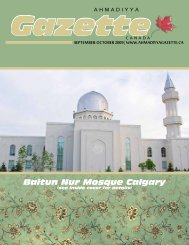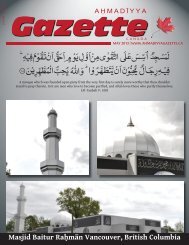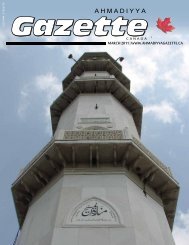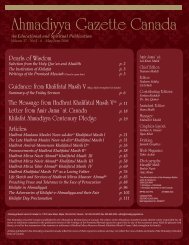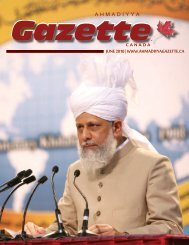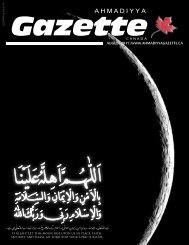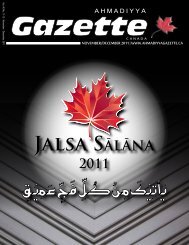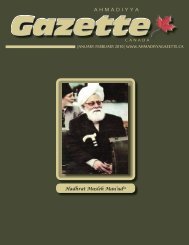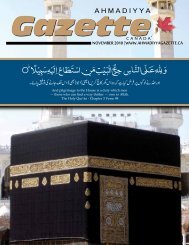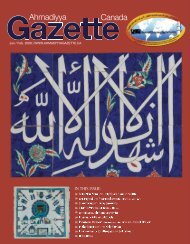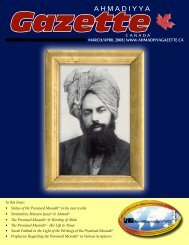English PDF - Ahmadiyya Gazette Canada
English PDF - Ahmadiyya Gazette Canada
English PDF - Ahmadiyya Gazette Canada
- No tags were found...
You also want an ePaper? Increase the reach of your titles
YUMPU automatically turns print PDFs into web optimized ePapers that Google loves.
than that it was Nānak’s settledintention to do away with thedifferences between those twoforms of belief, by institutinga third course which shouldsupersede, both of them.Reverend Hughes further writes thatwhile meeting Muslim dervishes,Gūrū Nānak used to greet themwith Islāmic greeting of “Assalamo-Alaikum”and receiving back thesame greeting of “Wa-Alaikum-Assalam”. Then Reverend Hughesdescribes the intimate and closerelationship of Gūrū Nānak withShaikh Farid that lasted for twelveyears. Sometimes this Shaikh faridis mistaken as Bābāfarid Shakar-Ganj who had passed away muchearlier than Gūrū Nānak. ReverendHughes writes:The most significant associatewhich Nānak found was,undoubtedly, Shaikh Farid…This strict Muhammadanbecame the confidential friendand companion of Nānak; andif all other traditions had failed,this alone would have beenenough to establish the eclecticcharacter of early Sikhism Thefirst greeting of these famousmen is significant enough,Shaikh Farid exclaimed,“Allāh, Allāh, O Darvesh”, towhich Nānak replied, “AllāhIs the object of my efforts, OFarid! Come, Shaikh FaridAllāh, Allāh (only) is overmy object” The words in theoriginal being Allāh, Farid,juhdi; hamesa au, Sekh Farid,juhdi Allāh Allāh (India OfficeMS, No 1728; fol. 86.) The useof the Arabic term juhdi impliesthe energy of the purpose withwhich he sought for Allāh; andthe whole phrase is forciblyMuhammadan in tone.An intimacy at once sprang upbetween these two remarkablemen; and Shaikh Faridaccompanied Nānak in all hiswanderings for the next twelveyears. The intended compromisebetween Hinduism and Islāmis shown not only in the factof this friendship but in theimportant circumstance that noless than 142 stanzas composedby Shaikh Farid are admittedinto the Adi Granth itself. Anexamination of these verses stillfurther proves the mingling ofthe two religions which Nānakeffected.…The fact that thecompositions of a genuine Sufīshould have been admittedinto the canonical book of theSikhs, and that they shouldcontain such a clear admixtureof Hindu and Muhammadanideas, is conclusive evidencethat Nānak, and his immediatesuccessors, saw no incongruityin the mixture. As soon as Nānakand his friend Shaikh Faridbegin to travel in company, itis related that they reached aplace called Bisi ar, where thepeople applied cow-dung toevery spot on which they hadstood, as soon as they departed(I.O MS, No 1728, fol. 94) Theobvious meaning of this is, thatorthodox Hindus consideredevery spot polluted whichNānak and his companion hadvisited. This could never havebeen related of Nānak had heremained a Hindu by religion.Reverend Hughes also describesthe meetings of Bābā Nānak withShaikh Ibrahim, who salutedhim us a Muslim, and had aconversation with him on the unityof God; Miyan Mitha, who calledupon him for the Kalimah whichleads to a long conversation, inwhich Bābā Nānak lays emphasison the Sufī doctrine of the unity ofGod. In this conversation, Nānaksays, “The book of the Qur’ānshould be practised.” (fol.144) Healso acknowledged that “justice isthe Qur’ān.” (fol. 148) When theMiyan asked him what is the onegreat name, Nānak took him asideand whispered it his ear, “Allāh”.Immediately the great name isuttered, Miyan Mitha is consumedto ashes; but a celestial voice againutters the word Allāh!” and theMiyan regains life, and falls at thefeet of Nānak. (fol. 147)Regarding pilgrimage to Mecca byGūrū Nānak, Reverend Hugheswrites:In precise conformity with thisdeduction is the tradition ofNānak’s pilgrimage to Mecca.The particulars of his visit tothat holy place are fully given,in all accounts of Nānak’s life,and although, as Dr. Trumppreasonably concludes, thewhole story is a fabrication, yetthe mere invention of the tale isenough to prove that those whomost intimately know Nānakconsidered his relationship toMuhammadanism sufficientlyclose to warrant the belief insuch a pilgrimage in the courseof his teaching in Mecca, Nānakis made to say: “Though men,they are like women, who donot obey the Sunnat, and Divinecommandment, nor the orderof the book (i.e. the Qur’ān).”.(I.O. MS. No. 1728, fol. 212.) He22 Bābā Gūrū Nānak—A Muslim Saint



